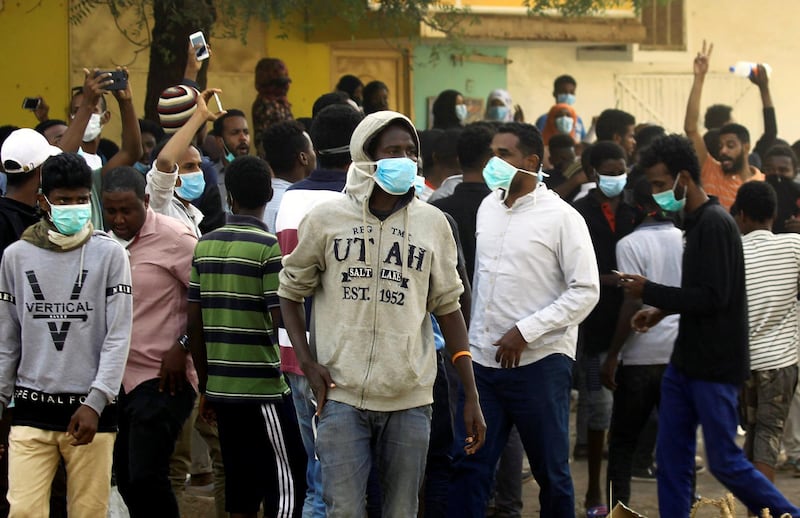Dr Babiker Abdelhamid was shot dead by police when he stepped out of his home during violent protests in Sudan’s capital of Khartoum on Thursday, witnesses say.
A fellow doctor, who asked to be identified only by the initials ST, said Abdelhamid had been treating injured protesters at home after security forces cut off the road to Royal Care Hospital, the nearest medical facility to the demonstration in the district of Burri.
"Dr Abdelhamid went out holding his arms up. He said that he had some critical cases that need to reach the hospital," Dr ST told The National, citing accounts from colleagues.
President Omar Al Bashir denied that the doctor was killed by security forces in a speech to supporters in White Nile state on Sunday.
“The doctor that was killed in Burri was killed by a weapon that did not belong to the army, or NISS, or police,” Mr Al Bashir said, referring to the National Intelligence and Security Services. “He was killed by someone among the demonstrators.”
Doctors and other members of Sudan's professional class have played a major role in Sudanese politics, helping bring down military dictatorships in 1964 and 1985. When Mr Al Bashir came to power through a coup in 1989, he outlawed all independent unions to secure his grip on power.
But professionals now pose a threat to his regime with their support for the anti-government protests. Security forces have responded by arresting doctors and storming hospitals.
Shortly after the demonstrations began on December 19, the doctors’ syndicate joined an umbrella of banned unions known as the Sudan Professionals Association in leading protests across the country.
Like most protesters, doctors are fed up with high inflation, austerity and the privatisation of state services, which have resulted in the high cost of medications and a steep decline in public healthcare services.
_______________
Read more:
[ Sudan's professionals lead calls for Omar Al Bashir to step down ]
[ Sudanese police shoot at mourners for slain protester ]
[ Sudan women join protests to fight for their rights ]
_______________
Dr Abdel Ibrahim, a plastic surgeon who volunteers at Soba university hospital in Khartoum, told The National that mounting number of protester casualties was overwhelming doctors.
“We are just trying to help our colleagues by volunteering in hospitals because every day there are many more injured people,” he said. “Many of the patients have been shot in the head, neck or chest, meaning that security forces are shooting to kill.”
Security forces are also cutting off access to life-saving care by closing roads and storming hospitals. Ambulances were prevented from entering Royal Care Hospital on Thursday, the doctors’ syndicate said in a statement.
Authorities also arrested doctors in Khartoum’s Al Faisal Hospital and fired tear gas in the emergency room.
On January 10, military forces stormed a hospital in the city of Omdurman, firing live bullets and tear gas in pursuit of demonstrators. Dr Nuha Ali, a plastic surgeon who was arrested in the raid, said she was beaten with a whip and a stick and held until midnight.
"The temperature in the detention centre was freezing and the psychological terror immense," she told The National. "It was dark and the only things around me were the concrete walls and broken plastic chairs."
Health Minister Mamoum Humaida condemned the attack on Omdurman hospital as "unacceptable" and promised an investigation.
But that has not stopped security forces from arresting and intimidating doctors, rights groups and activists say.
Saif Al Yazal, a Sudanese political exile in Sweden who is working with activists on the ground to monitor detentions and casualties, has recorded the arrest of 27 doctors since December 30. By his count, a total of 517 protesters have been arrested since December 19.
Human Rights Watch (HRW) reported that security forces were also threatening doctors to hand over bullets removed from injured protesters, which it saw as an attempt to hide evidence.
"The Sudanese government should know to not throw tear gas at hospitals or enter hospitals in pursuit of protesters or harass doctors," Jehanne Henry, associate director of the group's Africa division, told The National.
Security forces "must bring an immediate end to the continued onslaught against medical facilities and personnel, injured protesters and other people seeking treatment in hospitals,” Sarah Jackson, Amnesty International’s deputy director for East Africa, said in a statement.
Despite the pleas, doctors expect the crackdown to continue, though they vow to never stop aiding their people.
“We want change,” Dr Ibrahim said. “Doctors are part of this revolution and that’s why we are being targeted by security forces.”





